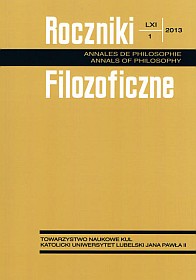O moralnym zaangażowaniu powieści realistycznej, modernistycznej i postmodernistycznej
Abstract
The present paper discusses moral ideas expressed in the contemporary novel of the realistic, modernist and postmodern conventions. More precisely, it tries to define how the poetics of a given convention determines the novel’s ethical thought. It is argued that both the modernist and postmodern fiction, which are often perceived as amoral or relativist, are morally committed, though perhaps not as much as the realistic convention. The shape of this moral commitment is consistent with the dominant of each convention (epistemological in modernism and ontological in postmodernism). These theoretical considerations are subsequently illustrated with three case studies of Virginia Woolf’s novels (each of which represents a different convention). Throughout the whole essay the emphasis falls on the meaning of the novelistic form, i.e. on the way that the novel’s form conveys the novel’s interpretation of reality.
References
Barnes, J. Flaubert’s Parrot. 1984. London: Vintage Books 2009.
Barnes, J. Nothing To Be Frightened Of. Random House Canada 2008.
Cunnningham, H. “Dickens as a Reformer.” A Companion to Charles Dickens. Ed. by D. Paroissien. Malden: Blackwell 2008. 159-173.
Daiches, D. A Critical History of English Literature. Vol. 2. London: Mandarin 1984.
Diamond, C. “Martha Nussbaum and the Need for Novels.” Renegotiating Ethics in Literature, Philosophy, and Theory. Ed. by J. Adamson, R. Freadman and D. Parker. Cambridge: Cambridge UP 1998. 39-64.
Eco, U. “Form as Social Commitment.” The Open Work. Tr. by A. Cancogni. Cambridge: Harvard UP 1989. 123-157.
Eaglestone, R. “Postmodernism and Ethics Against the Metaphysics of Comprehension.” The Cambridge Companion to Postmodernism. Ed. by S. Connor. Cambridge: Cambridge UP 2004. 182-195.
Głąb, A. “Literatura w filozofii moralnej.” Rozum w świecie praktyki: poglądy filozoficzne Marthy C. Nussbaum. Warszawa: Wydawnictwa Akademickie i Profesjonalne 2010. 125-159.
Griffiths, N. Sheepshagger. London: Jonathan Cape 2001.
Hawthorn, J. Studying the Novel. 1985. London: Hodder Education 2005.
Humpherys, A. “Hard Times.” A Companion to Charles Dickens. Ed. by D. Paroissien. Malden: Blackwell 2008. 390-400.
Hutcheon, L. A Poetics of Postmodernism: History, Theory, Fiction. London: Routledge 2003.
Ishiguro, K. The Unconsoled. 1995. London: Faber and Faber 2005.
John, E. “Art and Knowledge.” Routledge Companion to Aesthetics. Ed. B. Gaut and D. McIves Lopes. London: Routledge 2001. 329-340.
Johnson, B. S. Albert Angelo. 1964. in B. S. Johnson Omnibus. London: Picador 2004.
Josipovici, G. “The Lessons of Modernism.” The Lessons of Modernism and other Essays. Basingstoke: Macmillan 1977. 109-123.
Lodge, D. “Consciousness and the Novel.” Consciousness and the Novel. London: Penguin 2003. 1-91
Lodge, D. “The Novelist at the Crossroads.” The Novel Today: Contemporary Writers on Modern Fiction. Rev. ed. Ed. by M. Bradbury. London: Fontana P 1990. 87-114.
Marcuse, H. The Aesthetic Dimension: Toward a Critique of Marxist Aesthetics. 1977. Tr. by H. Marcuse and E. Sherover. Boston: Beacon P 1978.
McEwan, I. Saturday. London: Jonathan Cape 2005.
McHale, B. Postmodernist Fiction. New York: Methuen 1987.
McMinn, J. “Versions of Banville: Versions of Modernism.” Contemporary Irish Fiction: Themes, Tropes, Theories. Ed. by L. Harte and M. Parker. Hampshire: Macmillan 2000. 79-99.
Nussbaum, M. C. “The Literary Imagination in Public Life.” Renegotiating Ethics in Literature, Philosophy, and Theory. Ed. by J. Adamson, R. Freadman and D. Parker. Cambridge: Cambridge UP 1998. 222-246.
Teske, J. K. “Filozofia nauki i sztuki z perspektywy metodologii Karla Poppera.” Studia Philosophica Wratislaviensia 4 (2009). 27-52.
Teske, J. K. “The Novel: A Store of Ideas vs. a Mode of Cognition.” PASE Papers in Literature, Language and Culture. Ed. by E. Gussmann and B. Szymanek. Lublin: KUL 1998. 377-386.
Teske, J. K. Philosophy in Fiction. Lublin, Wydawnictwo UMCS 2008.
Watt, I. “Realism and the Novel.” English Literature and British Philosophy: A Collection of Critical Essays. Ed. by S. P. Rosenbaum. Chicago: U of Chicago P 1971. 65-85.
Welsh, I. Filth. 1998. London: Vintage 1999.
Wilson, A. “Evil in the English Novel.” The Kenyon Review 2.29 (1967). 167-194.
Woolf, V. Jacob’s Room. London: Grafton 1976.
Woolf, V. Night and Day. London: Penguin 1992.
Woolf, V. Orlando. Ware: Wordsworth 1995.
Copyright (c) 2013 Roczniki Filozoficzne

This work is licensed under a Creative Commons Attribution-NonCommercial-NoDerivatives 4.0 International License.





